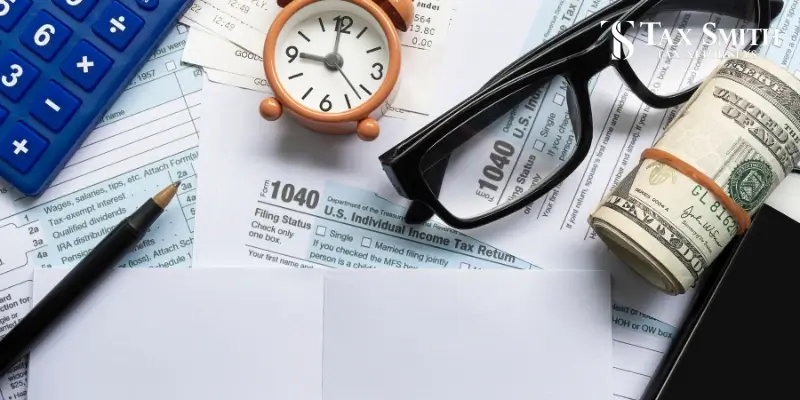1548 The Greens Way – Ste. 4 Jacksonville Beach FL 32250
Jacksonville Bank Levy Attorney
Jacksonville Bank Levy Lawyer
A bank levy is a powerful tool that creditors use to collect outstanding debts from a debtor’s bank account. This can be initiated by the Internal Revenue Service (IRS) for unpaid taxes. Other creditors may levy your account for unpaid debts such as credit card bills or personal loans. The bank levy process can be complex. However, it can be navigated with the help of an experienced Jacksonville bank levy attorney.
A Jacksonville IRS tactics attorney at TaxSmith, LLC can help you understand your rights and explore options to stop or reverse a bank levy, ensuring your financial stability is protected.

The Process of a Bank Levy
- Notice of Intent to Levy: Before a bank levy can be executed, the creditor must provide the debtor with a Notice of Intent to Levy. This notice serves several purposes, including informing the debtor of the impending bank levy, detailing the amount owed, and identifying the creditor seeking payment. Additionally, the notice offers the debtor a grace period, typically 30 days, to take action before the bank levy is executed. This grace period allows the debtor to explore various options. These include negotiating with the creditor, seeking legal advice, or paying the debt in full to prevent the levy from taking place.
- Levy Order: If the debtor fails to take appropriate action during the grace period, the creditor will proceed to obtain a levy order from the court. A levy order is a legal document that authorizes the creditor to seize funds from the debtor’s bank account to satisfy the outstanding debt. The creditor must provide proof of the debt. They must also demonstrate that they have exhausted other collection methods before the court grants the levy order.
- Bank Notification: Once the creditor has obtained the levy order, they will then notify the debtor’s bank of the order. The bank is legally obligated to comply with the levy order. They will be required to freeze the debtor’s account upon receiving the notice. This freeze prevents the debtor from accessing or withdrawing funds from the account while the levy is in effect. This freeze only applies to funds currently in the account when the bank receives the levy order. Future deposits, such as salary payments, will only be affected if a separate garnishment order is in place.
- Seizure of Funds: After the account has been frozen, the bank will wait a specified number of days, usually between 10 and 20 days. This gives the debtor a final opportunity to dispute the levy or make payment arrangements with the creditor. If the debtor fails to act during this waiting period, the bank will transfer the funds from the debtor’s account to the creditor to satisfy the debt. The seized funds will be applied towards the outstanding debt. Any additional fees or charges incurred during the bank levy process, such as legal fees or bank processing fees, may also be deducted from the debtor’s account.
Preventing a Bank Levy
- Negotiating With the Creditor: Communication is key to preventing a bank levy. If you are aware of an impending bank levy, it is advisable to contact the creditor quickly to discuss your financial situation. By being proactive, you can negotiate a payment plan or a settlement agreement. A traditional payment plan allows you to make smaller, more manageable monthly payments over an extended period. A settlement agreement typically involves paying a reduced lump sum to resolve the debt. Demonstrate a willingness to work with the creditor. Presenting a realistic repayment proposal can potentially prevent the bank levy from occurring.
- Wage Garnishment: In some cases, wage garnishment can be an alternative to a bank levy. Wage garnishment is a process where a portion of the debtor’s wages is withheld by their employer. This is then sent directly to the creditor until the debt is paid in full. This method of debt collection can be less disruptive to the debtor’s financial stability. It allows them to maintain access to their bank account while still addressing the outstanding debt. To explore this option, the debtor should contact the creditor to discuss the possibility of substituting wage garnishment for the impending bank levy.
- Filing for Bankruptcy: This can offer temporary protection from a bank levy by initiating an automatic stay. This halts most collection activities, including bank levies, while the bankruptcy case is pending. Depending on the type of bankruptcy filed, it can either restructure the debt or discharge it completely. Consult with a Jacksonville bankruptcy attorney to determine the most suitable bankruptcy option for your situation. By filing for bankruptcy, you can prevent a bank levy and work towards a more stable financial future.
Bankruptcy Chapters and Bank Levies: A Closer Look
Filing for bankruptcy can offer temporary relief from a bank levy. It stops most collection activities, including bank levies, while the bankruptcy case is pending. There are two common bankruptcy chapters that individuals can file to address their debts:
- Chapter 7 Bankruptcy: Often referred to as liquidation bankruptcy, Chapter 7 entails the sale of a debtor’s non-exempt assets, utilizing the proceeds to settle outstanding debts. A trustee appointed by the court supervises the liquidation process and the allocation of funds to creditors. A majority of unsecured debts, including credit card debts and medical expenses, can be discharged under Chapter 7 bankruptcy, effectively eliminating them. However, some debts, such as tax obligations, student loans, and child support, may not qualify for discharge. Moreover, not all individuals are eligible for Chapter 7 bankruptcy. Qualification for Chapter 7 depends on factors like income, expenditures, and the means test. These determine if a debtor has sufficient disposable income to repay their debts via a Chapter 13 repayment plan.
- Chapter 13 Bankruptcy: Recognized as a reorganization bankruptcy, Chapter 13 is tailored for individuals who possess a steady income source. They are also found to be capable of repaying a part of their debts over an extended period. In Chapter 13 bankruptcy, the debtor presents a repayment plan detailing the method of debt payment over a duration of three to five years. Filing for Chapter 13 bankruptcy can help avoid a bank levy by incorporating the levied debt into their repayment plan. Throughout the repayment phase, the debtor is shielded from collection efforts, such as bank levies and wage garnishments, provided they maintain timely plan payments. Any remaining eligible debts might be discharged at the end of the repayment term.

FAQs About Jacksonville, FL Bank Levy Law
How Do I Get My Bank Levy Removed?
For an official removal, you should first attempt to negotiate with the creditor for a levy release. You can work out a payment plan, settle the debt for a reduced amount, or find another resolution that satisfies both parties. If the levy is due to unpaid taxes, consider contacting a tax law attorney to explore ways to get out of tax debt and prevent future levies. They can discuss your options and negotiate with the IRS on your behalf. Filing for bankruptcy can also provide temporary tax relief from a bank levy. Still, it is essential to consult with a bankruptcy attorney. They can help determine if this is the right course of action for your situation.
Can Bank Accounts Be Garnished in Florida?
Yes, bank accounts can be garnished in Jacksonville, Florida. Creditors may obtain a court order to garnish a debtor’s bank account to collect an outstanding debt. However, specific exemptions and protections are in place for certain types of income. These include Social Security benefits, veterans’ benefits, and disability benefits. Additionally, Florida’s head-of-household exemption may protect the wages of those who provide more than half the dependent’s financial support. It is advisable to consult with an attorney familiar with Florida’s laws to determine if any exemptions apply to your situation.
Can I Open a New Bank Account If I Have a Levy?
Yes, you can open a new bank account if you have a levy on an existing account. However, the new account could also be subject to a levy if the creditor becomes aware of it. Opening a new bank account does not resolve the underlying issue of the outstanding debt. It is recommended to address the debt by negotiating with the creditor, considering bankruptcy, or seeking legal advice to explore your options.
How Long Does a Levy Stay on Your Bank Account?
A bank levy typically remains in effect until the debt is fully satisfied or the creditor releases the levy. When a bank receives a levy order, they will freeze the account and seize the available funds. If the seized funds do not cover the entire debt, the creditor may issue additional levy orders until the debt is paid in full. It is crucial to address the underlying debt by negotiating with the creditor or seeking legal counsel. You may also consider options like bankruptcy to resolve the issue and prevent further levies.
Contact Tax Smith Today
If you are struggling with a bank levy and need assistance, contact a tax law attorney from Tax Smith today. We have decades of experience in tax law and a history of winning similar bank levy cases. Tax Smith can help you resolve your levy issue and find a resolution that works with your financial situation. We are eager to assist you with our tax solutions and look forward to your call.
Locations We Serve
- Alabama
- Arizona
- California
- Colorado
- Connecticut
- Delaware
- District of Columbia
- Florida – HQ
- Georgia
- Idaho
- Illinois
- Indiana
REQUEST A CONSULTATION
Please fill out the Contact Request Form and a Tax Attorney/Paralegal will call you
to discuss legal representation or to schedule your free initial consultation





